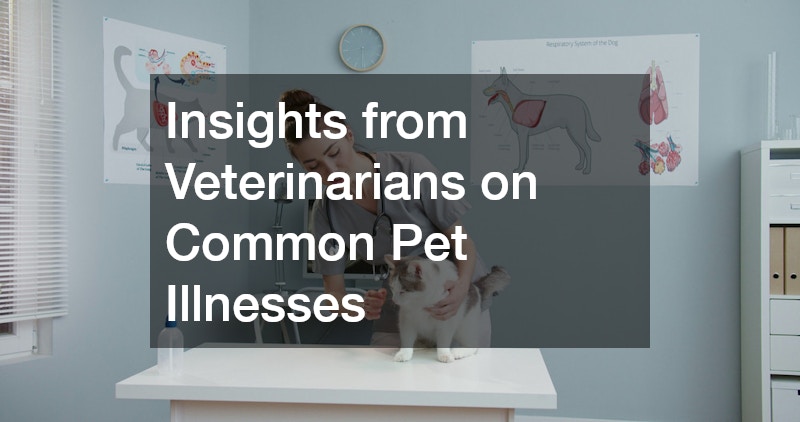

In this article, we explore valuable insights from experienced veterinarians regarding the most common illnesses faced by pets. Understanding these prevalent health issues can help pet owners take better care of their beloved companions. The expertise shared by veterinarians offers pet owners crucial knowledge on maintaining the well-being of their furry friends.
1. What Are the Most Common Pet Illnesses?
1.1 Recognizing Symptoms Early
Recognizing the early symptoms of illnesses in pets can significantly impact the outcome of their health issues. For instance, sudden changes in behavior might indicate underlying health concerns that require prompt attention. Pet owners should keep an vigilant eye on their pets, as early detection often leads to more successful treatment outcomes.
Physical appearances such as coat quality, weight changes, and unusual lumps should be monitored regularly. Behavioral alterations, including loss of appetite or unusual lethargy, are often early indicators of a developing condition. Acting swiftly upon noticing these changes by consulting a veterinarian can prevent the worsening of the illness.
Furthermore, awareness of common symptoms helps pet owners differentiate between minor and serious health concerns. Educating oneself on different manifestations of illnesses in pets fosters proactive health management. Ultimately, early recognition of symptoms plays a vital role in ensuring the long-term health and happiness of both dogs and cats.
1.2 Illnesses in Dogs
Dogs are prone to certain illnesses that, when detected early, can often be managed or even prevented. Common issues such as hip dysplasia primarily affect larger breeds and are often genetically inherited, requiring regular monitoring for effective management. Additionally, skin conditions like dermatitis can arise from allergies or environmental factors, necessitating a comprehensive approach to care.
Obesity is another prevalent issue among dogs, leading to various secondary health problems if not addressed. Regular exercise and a balanced diet play a crucial role in managing a dog’s weight and preventing obesity-related complications. Veterinary consultations are vital in formulating a diet and exercise plan tailored to an individual dog’s needs, thereby enhancing their quality of life.
Dental diseases are frequently overlooked but can cause significant discomfort and health issues in dogs. Regular dental checkups and proper oral hygiene can prevent the progression of dental diseases. Pet owners should become familiar with dental health practices and consider them an integral part of their pet’s routine care.
1.3 Illnesses in Cats
Cats, like dogs, have their own set of common health issues that pet owners should be aware of. Urinary tract infections are frequent in cats, especially those with limited water intake, highlighting the importance of monitoring their hydration levels. Providing fresh water sources and encouraging regular drinking can help in preventing these infections.
Diabetes in cats is a growing concern, often linked to lifestyle factors such as obesity and inactivity. Regular monitoring of a cat’s weight and feeding habits can aid in the prevention and early detection of diabetes. A combination of a balanced diet and sufficient physical activity is essential in maintaining a healthy blood sugar level.
Feline asthma is another condition that affects a significant number of cats and can be triggered by various allergens. Understanding the environmental triggers and employing preventive measures can help reduce the frequency of asthma attacks. Regular veterinary checkups and the right medication can manage symptoms and improve a cat’s quality of life.
2. How Can Pet Owners Prevent These Illnesses?
2.1 Importance of Regular Vet Checkups
Regular veterinary checkups are an indispensable part of preventative pet care, allowing for early detection of potential health issues. Vets can perform a range of diagnostic tests during these visits, providing insight into a pet’s overall health and preventing the escalation of minor issues. Additionally, these checkups serve as an opportunity to update vaccinations and discuss any concerns with a professional.
Establishing a schedule for routine veterinary visits ensures that a pet’s health is consistently monitored, thereby reducing the risk of unexpected illnesses. Preventive care, including vaccinations and parasite screenings, forms a core component of these visits. The vet’s guidance helps pet owners make informed decisions about their pet’s diet, exercise, and lifestyle, aligning with their specific health needs.
Communicating openly with veterinarians about observed changes or concerns allows for a tailored approach to a pet’s healthcare strategy. Building a trusting relationship with a veterinarian can significantly improve care outcomes and foster a proactive approach to pet health. Overall, regular vet checkups empower pet owners to be vigilant in preventing illnesses before they arise.
2.2 Balanced Diet and Nutrition
A balanced diet is vital for maintaining a pet’s health, playing a pivotal role in preventing many common illnesses. Tailoring a diet to meet the specific nutritional needs of a pet requires an understanding of factors such as age, breed, and activity level. Working closely with a veterinarian or pet nutritionist helps in selecting the appropriate diet for optimal health.
High-quality commercial pet foods are generally formulated to provide balanced nutrition, but it is important to check ingredient lists for anything that might trigger allergies. Homemade diets should be considered carefully, ensuring they contain all necessary nutrients to sustain health and vitality. Monitoring the pet’s response to their diet over time can offer insights into necessary adjustments.
Additionally, providing portion control to prevent overeating is crucial in avoiding obesity and related complications. Regularly assessing a pet’s weight and adjusting food intake ensures they remain within a healthy weight range. Establishing consistent feeding routines and treating with moderation further support a pet’s nutritional wellness.
Understanding common pet illnesses and their prevention, along with exploring treatment options, empowers pet owners to ensure a healthy and happy life for their pets. Regular veterinary guidance and responsible pet care practices are key components of maintaining pet wellness. By staying informed and proactive, pet owners can create nurturing environments that foster their pets’ longevity and vitality.
